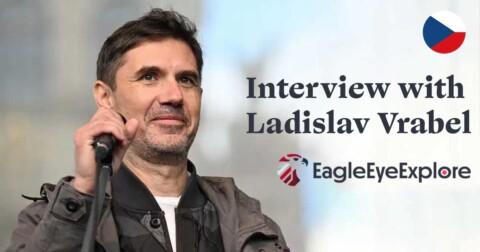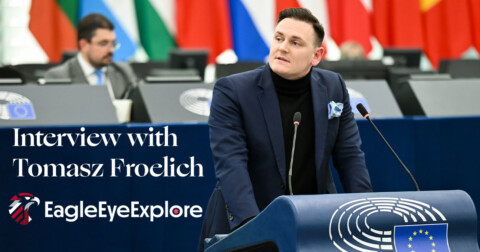In recent years, Americans have replaced and upgraded their weapons and missiles in Germany, to the left of the Rhine, to the point where local authorities and mayors are unaware of the location of these arsenals. In France, which is also a NATO member, there is not a single American soldier stationed, whereas Germany hosts around 40,000. All of this is funded by German taxpayers. The Americans have their largest military hospital in Wiesbaden, which means they are in Germany to stay. This reflects the old Atlanticist concept that the U.S. military must be on the other side of the Atlantic to protect its interests from there, says Thor von Waldstein, a doctor of political and legal sciences, a constitutional lawyer, author of several books, and a figure highly trusted in German intellectual circles, in an interview with our portal.
The EU was founded on liberal principles. How do economic freedoms align with political sanctions, and is the EU transforming from an economic into a political, security, and ideological community?
The EU hasn’t pursued an economic policy for a long time, not only in terms of sanctions but also in terms of domestic subsidy policies, which are often reckless and problematic. When it comes to representing general European interests within the EU, skepticism is warranted. National interests are increasingly becoming European interests, but when viewed realistically, it seems that the EU’s policies align more with American interests. It cannot be in Europe’s interest for a war to be waged in Central Europe. Europe’s interest would be to find common ground with the largest country in the world to eliminate the threat of war. Since we are in Belgrade today, it’s worth noting that Brussels is geographically in the far western part of Europe. With the UK no longer in the EU, this geographical positioning is, in a way, programmatic. If the EU’s headquarters were in Vienna or Budapest, governance might be different.
How sovereign can Germany truly be with American military bases on its territory, and are the rumors true that every German chancellor signs a secret document from the post-WWII occupation era, confirming their obligations to the Western allies upon taking office?
You are well-informed. There are so-called “chancellor acts” that every chancellor must sign upon taking office. However, this is merely a rumor. There is no concrete proof of this, but it’s not decisive. Regardless of whether these acts exist or not, every federal chancellor since Adenauer in 1948 has not pursued a foreign policy solely in Germany’s interest. Hence, Germany was a potential battlefield for atomic war between the Soviet Union and the U.S. during the Cold War and remains a potential site for atomic conflict if a war between Russia and NATO breaks out.
To what extent does the U.S. owe its hegemonic position to Germany?
If the Americans were to withdraw from Western Europe, they would no longer be a global power. They would face what they experienced in the South China Sea, where they gradually had to pull back their troops and aircraft carriers. American hegemony is based on its presence in Germany. Of course, the U.S. is allied with other countries—such as the UK, the Netherlands, Spain, and Portugal—but the main pillar of U.S. power in Europe is in Germany. Few people know, even legally, that American soldiers in Germany are exempt from the legal system. When an American soldier commits a wrongdoing in town, such as raping a woman or causing trouble, they do not answer to German laws but rather to special courts. This situation resembles war or an occupation state.

There were reports that classified documents leaked from the Bundestag discussing a potential and close conflict with Russia and Germany’s preparations for a possible war. Is the debate about sending “Taurus” and other weapons to Kyiv a provocation in that direction?
I am not familiar with specific documents, but there is no doubt that Germany has been arming itself over the past two years. During this time, the stock value of Rheinmetall, a munitions manufacturer, has risen, and the German Defense Minister is working on producing new weapons and rockets. Of course, this can be interpreted in two ways: one might say it’s purely for defense, but certain weapons can be used not only for defense but also for attack. I cannot speak about specific details, as I am not a military expert.
By allowing its weapons to be used in attacks on Russian territory, is Germany demonstrating readiness for a potential Russian response?
There are voices in Europe saying that we are already in World War III, we just haven’t noticed it yet. And, of course, it is very dangerous for German drones to be firing not only on Ukrainian territory but also on Russian territory. If tomorrow some corresponding actions were to come from Russia, it could not be said that they were unprovoked. This makes the German federal government’s policy all the more irresponsible, to return to the previous question—our protection against such an attack from Russia is ineffective; it simply doesn’t exist. The German population is being consciously left unprotected in such a situation. And Russia is being treated as if it were a small South American country with no nuclear weapons, which is not a good idea. Russia cannot be militarily defeated, and thus reconciliation with Russia appears to be the only solution.
You are a constitutional lawyer. The German Constitutional Court enjoys significant authority in our constitutional law. Is that a realistic view or a misconception?
There is no straightforward answer to that question. Of course, it’s good that there is a constitutional court that protects citizens’ basic rights and ensures that constitutional provisions are respected. The theory, as we know from Montesquieu—the separation of powers—dictates that there should be a judiciary alongside the legislative and executive branches. The judiciary’s role is to oversee the executive and legislative branches and ensure they adhere to the law. That’s the theory, but the reality is that all key decisions in the legislative, executive, and judicial branches—including the court in Karlsruhe—are largely determined by politics and political parties. This undermines the separation of powers and often leads to decisions in Karlsruhe that are not based solely on the constitution but are influenced by political considerations. Many people in Germany believe the Karlsruhe court is more of a political body than a judicial one. This perception has been reinforced by incidents such as the court’s judges dining with Angela Merkel. While the court once had a solid reputation, its standing has suffered in recent years due to its actions. During the COVID-19 pandemic, Germans’ basic rights were trampled upon, and the Constitutional Court did nothing to oppose this. It accepted all executive decisions without raising critical questions. Much of what was enacted was extremely problematic.

The Constitutional Court, however, sided with freedom of speech in the case of the attempt to ban the “Compact” magazine, didn’t it?
That’s a nuanced situation. The decision in the “Compact” case is provisional. It’s not about whether the decision by German Minister Nancy Faeser was right or wrong, but rather about a temporary assessment. The state’s interest in enforcing the ban did not outweigh “Compact’s” interest in avoiding harm. The Constitutional Court decided that the process could take years, but in that time, the magazine would be dead. However, this is a completely separate issue from the main ruling. It’s still highly questionable whether “Compact” will win the main case, as there is a previous ruling from the Federal Constitutional Court stating that the recognition of an ethnic concept of the people is unconstitutional. If “Compact” advocates such an ethnic position, the ruling could go in the direction that advocating such an ethnic concept violates the human dignity of foreigners. Based on that precedent, it seems likely that “Compact” may ultimately be banned.
What is meant by the ethnic concept of the people—what’s so alarming about it?
The ethnic concept of the people, which is now supported by national Germans, and what was legally defined until 1999, concerns origin, shared culture, and common history, meaning that a German is someone with a German father or mother. Based on this ethnic principle, many Germans from Russia, for example, were accepted and integrated into Germany after the war as Germans. They had Russian passports but were of German descent, which entitled them to receive German passports as well. That’s the ethnic concept of the people. In contrast, the current ruling orientation in Germany focuses solely on nationality, or the passport. And it’s well known how easy it is to obtain a German passport. One joke says it’s easier to get a German passport than a U.S. visa. In Egypt, I even met people with German passports who could only communicate in English.





